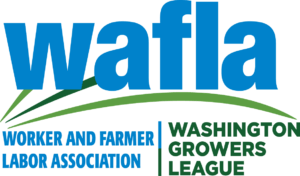Judge reinstates higher piece-rates for WA farmworkers
Judge reinstates higher piece-rates for WA farmworkers
Link to the reprinted article in Big Country News
By Jordan Allyn
Yakima Herald-Republic
July 5, 2024
A federal judge has accepted a request from Washington farmworkers for increased wage rates.
Familias Unidas por la Justicia AFL-CIO, a Skagit County-based farmworker union, challenged the rules for paying farmworkers.
Judge John H. Chun's decision on a preliminary injunction Tuesday will affect the state's cherry, apple, pear and berry harvests, as the case continues to make its way through the U.S District Court of Western Washington.
Represented by Columbia Legal Services, the union asked the Department of Labor to protect domestic farmworkers’ salaries as they relate to the H-2A foreign guest worker program.
“We're really pleased,” said Columbia Legal Services attorney Andrea Schmitt. “It shows that the court understands the urgency of this problem.”
The judge reinstated higher piece-rates, which are based on how much fruit a worker can pick per hour. Piece-rates have been historically higher than the state’s minimum wage for H-2A workers.
The H-2A program provides temporary U.S. visas to foreign agricultural workers. Each year the Washington State Employment Security Department, funded by the Department of Labor, conducts a wage survey to decide the prevailing rate for the H-2A workers. Because of market conditions, those rates also affect domestic worker wages.
According to statute, H-2A visas cannot be issued if the employment of foreign labor would “adversely affect the wages and working conditions of workers in the United States similarly employed.” Schmitt argued in the hearing that domestic workers were being adversely affected by the H-2A system this harvest.
Last year’s H-2A wage survey ignited the lawsuit.
The Employment Security Department instituted new regulations for the survey that took effect last year. Familias Unidas por la Justicia alleges that the changes led to lower wages for H-2A workers and incentivized growers to pay local workers less.
Chun reinstated the results of the survey conducted in 2020, prior to the new regulations.
“The declarations make clear that Washington farmworkers earn more wages when working at a piece-rate pay system versus an hourly pay system, and that these workers rely on these wages to survive,” Judge Chun wrote in his decision. Piece-rate earnings can be up to double the minimum wage.
Washington Farm Labor Association CEO Enrique Gastelum argued that the 2020 survey methodology was flawed.
“I strongly disagree with the judge's decision to reinstate 'stale' prevailing wages and ignoring the realities of the volatile economic and market conditions that farmers face in Washington,” he wrote in an email to the Herald-Republic.
Gastelum defended the one-year rule, which removes H-2A prevailing wage surveys after 12 months. This was one of the new regulations that the union argued created fewer prevailing wage determinations, and which the judge told federal officials not to enforce.
The timeline for implementing the new prevailing wages has not yet been set. Many growers will have to update their contracts and thousands of workers will receive new wages.
“Farmers will need to carefully review this ruling and their individual impacts,” Gastelum wrote.
The judge didn't make a decision on Familias Unidas' request to pause new H-2A applications, and there are other issues still pending. Schmitt said the Department of Labor should not admit new foreign workers until the process of determining prevailing wages adequately protects the local economy.
This case is one of many recent attempts to protect Washington farmworker rights. Schmitt said that H-2A workers are less likely to organize because their visas can be terminated as retaliation. Local workers, she said, have to organize to create protections for all workers, both foreign and domestic.
Edgar Franks, the political director for Familias Unidas por la Justicia, said “I think that this case can determine how we approach organizing farmworkers for more justice down the line."
